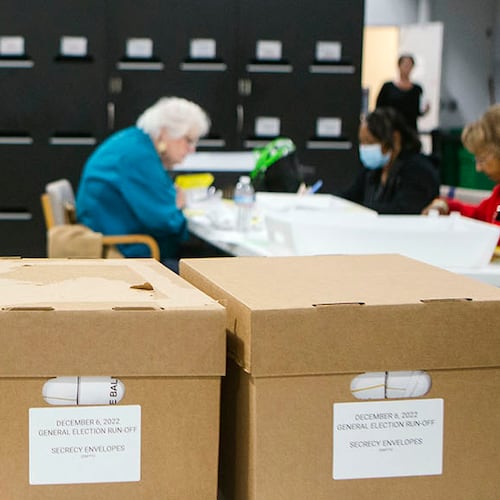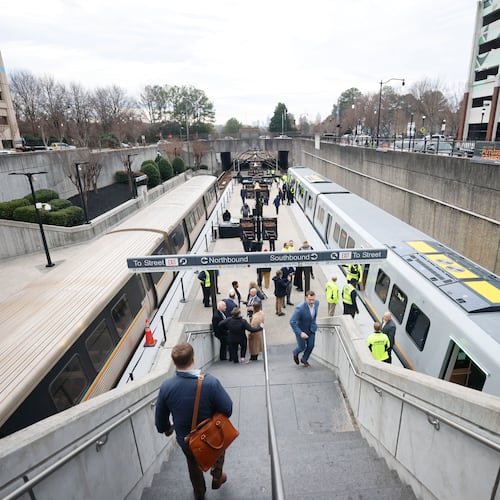Georgia’s state legislative session ended abruptly with one major question left up in the air: the fate of a ban on the use of QR codes in the state’s election infrastructure. The codes were outlawed in 2024, but no resources were provided to implement the policy, and the secretary of state’s office has lobbied for its reversal. If the problem isn’t resolved soon, it could cost Georgians tens of millions of dollars — with little to show for it.
At the same time, Donald Trump just signed an executive order that would require proof of U.S. citizenship for all voters, while remaking much of the nation’s existing election technology. If implemented, these policies could cast much of our voting system into chaos.
Most people are, by now, familiar with the concept of QR codes — you scan a small box made up of uniquely placed dots using your mobile device, which then gives you a result. We used these codes to order at restaurants during the Covid-19 pandemic. They have appeared in Super Bowl commercials and in church pews to allow newcomers to learn more.
These codes have also been used for years by election technology companies to deliver ballot information to vote tabulators. The way the process works is that election officials feed ballots into vote-counting machines, where the QR code is scanned to retrieve a voter’s information (such as precinct and ballot style, not personal identifying information) and ballot selections. This has become a common practice in red, blue, and purple states across the country.
In recent years, though, this process has fueled “stolen election” conspiracy theories targeting Dominion Voting Systems and other election technology companies. The allegation is that QR codes, which the human eye cannot read, are less secure than machines capable of reading English text. This leads to the belief among many that the use of these codes could make Georgia’s elections vulnerable to widespread fraud. Advocates of this theory prefer hand-counting or machines that read written text only.
That led in part to Trump’s new executive order, which includes a provision giving officials 180 days to remove QR codes from ballots and replace them with human-readable alternatives. Doing so would cause state election officials to incur massive costs, which are not covered by any new funding. And it threatens to throw the U.S. Election Assistance Commission, a federal agency that serves as a resource for states in administering elections, into chaos.
Similar action is taking place at the state level. Georgia passed a law last year that included a provision requiring that QR codes be removed from ballots. No funding was provided for officials to implement this change, which would necessitate manual adjustments or the wholesale replacement of approximately 40,000 pieces of equipment. Gabe Sterling, the chief operating officer of the Georgia secretary of state’s office, testified that it would cost the state $25 million to $300 million to make the change, with little or nothing to show for it in terms of enhanced election security.
We sympathize with Sterling and Secretary of State Brad Raffensperger, who also opposes the initiative. As former secretaries of state tasked with the oversight of elections in conservative Southern states, we understand the critical importance of ensuring elections are secure and all legal ballots are counted freely and fairly. During our times in office, we implemented strict safeguards to bar noncitizen voting, enhance enforcement provisions and ensure that the final counts accurately reflected the will of the people.
The potential damage caused by these new policies, if implemented, would be significant for the people of Georgia. They fail to meet any logical standard that would justify such sweeping changes, and many of their most high-profile proponents can’t articulate a basic case in support of them. Ultimately, it is the election workers — hardworking, patriotic, civic-minded people who want to be part of the democratic process — who would suffer the most should they move forward and throw our election system into chaos.
Secretary Raffensperger has already demonstrated that Georgia’s elections are overwhelmingly secure. After the 2024 election — an election in which QR codes were widely used — his office conducted a hand-count audit of the results to ensure accuracy. The result: Vote-counting in the state is unquestionably accurate. “There were discrepancies found on 87 ballots out of the 5,297,262 cast,” the secretary wrote. “That represents 0.001642% of the ballots. All 87 were due to human reviewers attempting to discern voter intent.”
No election technology currently exists at scale that would meet the “human readable” requirement outlined in the bill. In the absence of such technology, some lawmakers have pointed out that a “strict interpretation” of the bill would instead require hand-counting all ballots in the state. Georgia has 8.3 million registered voters, and last year, the state ran 1,955 individual contests. We know from research and human experience that hand-counting is slower, less accurate, and more costly than machine-counting. This would be the worst possible outcome and a major disservice to all Georgians.
Georgia is a solidly purple swing state that is fortunate to have capable, serious, conservative leadership in the governor’s mansion and secretary of state’s office. Those opposing QR codes in elections can’t point to far-leftist election administration practices that would justify this law. Gov. Kemp and Secretary Raffensperger have proved over multiple election cycles that they can — and do — conduct elections safely, securely and effectively, without regard to partisan political preferences.
As former election officials who share a similar outlook, we understand the need to bolster election security — but within reason. Unfortunately, the current law does not meet that standard.
Credit: contributed
Credit: contributed
Credit: contributed
Credit: contributed
John H. Merrill was Secretary of State of Alabama from 2015 to 2023. Trey Grayson was Secretary of State of the Commonwealth of Kentucky from 2004 to 2011. They lead the Secure Elections Project, a nonpartisan organization dedicated to preserving and protecting the sanctity of American elections.
About the Author
Keep Reading
The Latest
Featured




